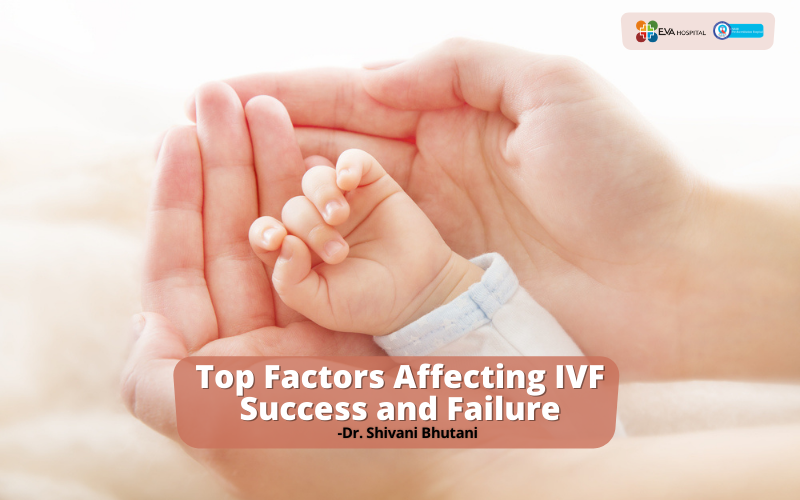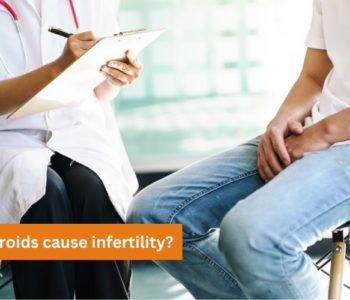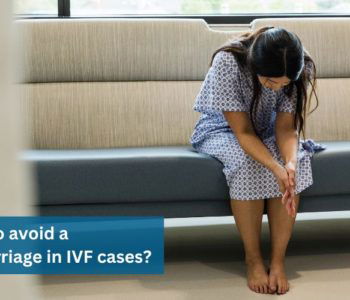Top Factors Affecting IVF Success and Failure
 Eva Hospital
Eva Hospital
Top Factors Affecting IVF Success and Failure
The first success of the In-vitro fertilization (IVF) for women who could not conceive came for the first time back in 1978. The procedure has evolved a lot since then and given the joy of parenthood to countless couples worldwide. Nevertheless, statistically, the average success rate of IVF globally is under 50 percent. In other words, nearly half the attempts fail. This does not mean that the techniques are not –so advanced. They are, but mostly it is the unique situation of each individual couple that decides the success or failure of IVF. Also, with the right doctors and medical investigation, failure can be converted to success.
What is IVF or In vitro fertilization?
IVF is one of several methods that can help people with fertility problems to have a child.
During the procedure, an egg is removed from the woman’s ovaries and fertilized with sperm in a laboratory or in-vitro. Simply put, the fertilization occurs outside of the womb. The fertilized cell, called an embryo, is then planted in the female’s uterus to grow and develop. It can be done using your eggs and your partner’s semen, or one or both from donors.
There are mainly five phases involved in it:
- Ovarian Stimulation,
- Egg Retrieval,
- Sperm Retrieval,
- Fertilization,
- Embryo Implantation
Any hindrance or inadequacy in any of these five phases can decide the result of the procedure.
Let us define some terms first
Ovum- egg. Ova, oocytes
Sperm- The male reproductive cell contained in the semen
Ovaries- the female glands that release ova. 2 in number.
Uterus- the womb
Fertilization- the process of fusion of ovum and sperm cell
Embryo- after the eggs are fertilized, they are called an embryo
What factors affect IVF success or failure?
Since IVF is an emotional as well as expensive procedure, patients want to calculate their chances first.
One must know that pregnancy and childbirth are complex biological processes. Everything may be right but results can be ambiguous. Nevertheless to increase your chances, choose a fertility clinic with a high success rate.
However, when looking at the reasons for the failure of IVF, infertility specialists have been able to identify some specific factors governing the realization of fertility via IVF:
Unavailability of Quality Eggs
An embryo is formed by the fusion of ova and sperm. For this, the eggs must have a high quality and also be in good numbers. Failing this, the odds of embryo formation are low. Usually, when the woman is in her most fertile years (near about 3 years), the ova have very good quality and abundance, which makes it easy for fertilization to occur. There are other factors too that affect the quality of oocytes, besides age.
If the mother herself does not have good eggs, the chances of pregnancy are low. Other options for ova have to be looked at.
Age of the female
For the record, the younger the woman is, the higher are her chances of a full-term normal pregnancy. Advanced age affects infertility in diverse ways- the quality of eggs, the uterus, and other biochemistry facts. However, IVF has been used successfully to help women of every age, to get the joy of motherhood. So, no matter your age is you are ready to explore the stage of the IVF as an option. While some lay too much stress on the age factor, every female’s body and your medical history are distinctive. You must consult your doctor, and go for comprehensive blood and ultrasound tests. Then your doctor can better advise you on your candidacy for IVF, rather than basing it only on age.
However, if the female is going to be utilizing donor eggs, the age effect can be ignored.
Fertilization failure or poor fertilization
As we learned, fertilization occurs in-vitro, outside the body, in a petri dish so to say. Several ova (eggs) from the female and sperm from the male are put together in a conducive medium for fusion or insemination.
If less than 20 percent of ova are inseminated, it is considered poor. A big number of fertilized eggs are required for IVF to succeed. The more the number, the greater are the chances of implantation.
Poor fertilization has been linked to primary infertility, low count of ova, and sperm factor.
Failure of implantation
Implantation failure is the most common factor in IVF success or failure. You see after the eggs are fertilized, you get embryos. IVF specialist doctors prepare a number of them because not all of them would get implanted on the uterine wall and grow to become a fetus. Not all fertilized embryos latch onto the uterus successfully. About 40% do. Of course, the doctors take this account and proceed accordingly. But still, it is biology! Despite the best efforts by doctors, transplantation may succeed or fail due to parameters such as age, Low oocyte retrieval, or embryo utilization rate.
Ovarian response
The combination of the health of the uterus, responsiveness to IVF medications, and female age govern what is called the ovarian response. A woman’s ovaries release one egg per month from an ova bank. Before doctors start IVF treatment, drugs are prescribed so that the ovaries release more eggs per month. In case the female already has fewer eggs in her bank and does not respond to the medications, IVF is doubtful.
Alternatively, if the female responds well to the medicines and yields multiple eggs, there is a very high and healthy chance of success.
Sperm quality
The sperm has a crucial role to play in IVF success. To fertilize the eggs, the sperm must be healthy, possess high motility, and be large in number (sperm count).
Healthy and mobile sperm can release enzymes that soften the egg membrane so that the sperm enters the egg cell and fertilizes it. The miracle of life!
Though it is uncommon, due to chromosomal factors, sperms are not able to perform the above process. Nevertheless, this can be detected even before the doctors proceed for such a treatment. Semen analysis of the male helps doctors know the problem and prescribe treatment.
Alternatively, a sperm donor can be considered.
Conclusion
IVF is a miracle. It can happen to you. The above are just a few factors. Nevertheless, competent doctors at IVF clinics weigh the positive and negative factors and plan the treatment in a way that tackles the very problem and allows for better chances of success.









